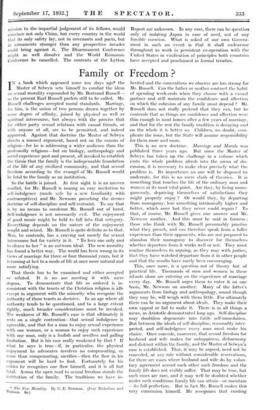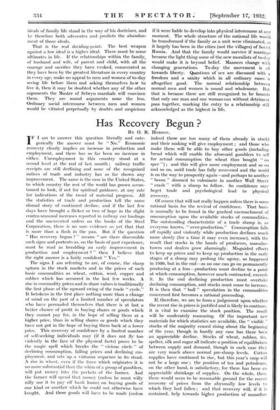Family or Freedom ?
IN a book which appeared some ten days ago* the Master of Selwyn sets himself to combat the ideas on sexual morality expounded by Mr. Bertrand Russell— as the present Earl Russell prefers still to be called. Mr. Russell challenges accepted moral standards. Marriage, for him, is the union of two persons drawn together by some degree of affinity, joined by physical as well as spiritual intercourse, but always with the proviso that for either party sexual relations with casual friends, or with anyone at all, are to be permitted, and indeed approved. Against that doctrine the Master of Selwyn directs a massed argument, based not on the canons of religion—for he is addressing a wider audience than the professedly religious—but on biology, anthropology and social experience past and present, all invoked to establish the thesis that the family is the indispensable foundation of the life of any civilized community, and that sexual freedom according to the evangel of Mr. Russell would be fatal to the family as an institution.
So the battle is joined. At first sight it is an uneven conflict, for Mr. Russell is issuing an easy invitation to self-indulgence (made safe by a new familiarity with contraceptives) and Mr. Newsom preaching the sterner doctrine of self-discipline and self-restraint. To say that is by no means to condemn Mr. Russell out of hand. Self-indulgence is not necessarily evil. The enjoyment of good music might be held to fall into that category. Everything depends on the nature of the enjoyment sought and seized. Mr. Russell is quite definite as to that. Man, he contends, has a craving not merely for sexual intercourse but for variety in it. " To love one only and to cleave to her " is an outworn ideal. The new morality has found a better way. The world has been wrong in its views of marriage for three or four thousand years, but it is turning at last to a mode of life at once more natural and more satisfying.
That thesis has to be examined and either accepted or refuted. It is no use meeting it with mere dogma. To demonstrate that life so ordered is in- consistent with the tenets of the Christian religion is idle except in argument with the minority who recognize the authority of those tenets as decisive. In an age where all authority tends to be questioned, and to a large extent rightly, much broader considerations must be invoked. The weakness of Mr. Russell's case is that ultimately it rests on a single contention—that sexual indulgence is agreeable, and that for a man to enjoy sexual experience with one woman, or a woman to enjoy such experience with one man, only is a foolish and needless and galling limitation. But is his case really weakened by that ? If what he says is true—if, in particular, the physical enjoyment he advocates involves no compensating, or more than compensating, sacrifice—then the flaw in his argument will be hard to find. Fortunately for his critics he recognizes one flaw himself, and it is all but fatal. Across the open road to sexual freedom stands the institution of the family. The traditions we have in- * The New Morality. By G. E. Newsom. (Ivor Nicholson and Watson. Cs.) herited and the conventions we observe are too strong for Mr. Russell. Can the father or mother contract the habit of spending week-ends when they choose with a casual partner and still maintain the confidence and affection on which the cohesion of any family must depend ? Mr.
Russell does not really pretend that they can, but he contends that as things are confidence and affection wear thin enough in most homes after a few years of marriage, and that for the rest the family tradition is decaying and on the whole it is better so. Children, no doubt, com- plicate the issue, but the State will assume responsibility for them more and more.
This is no new doctrine. Marriage and Morals was published three years ago. But since the Master of Selwyn has taken up the challenge in a volume which casts the whole problem afresh into the arena of dis- cussion, it is necessary to make clear precisely what the problem is. Its importance no one will be disposed to underrate, for this is no mere clash of theories. It is something that touches the life of the ordinary man and woman at its most vital point. Are they, by living mono- gamously, depriving themselves of satisfactions they might properly enjoy ? Or would they, by departing from monogamy, lose something intrinsically higher and better, which once lost they never could regain ? To that, of course, Mr. Russell gives one answer and Mr. Newsom another. And this must be said in fairness : those who think with Mr. Russell presumably practise what they preach, and can therefore speak from a fuller experience than their opponents, who are not prepared to abandon their monogamy to discover for themselves whether departure from it works well or not. They must confine themselves to arguing, as they may with justice, that they have watched departure from it in other people and that the results have rarely been encouraging.
This, once more, is a question not of theory but of practical life. Thousands of men and women in these islands alone are entering on the experience of marriage every day. Mr. Russell urges them to enter it on one basis, Mr. Newsom on another: Many of the latter's arguments from biology and anthropology, sound though they may be, will weigh with them little. Fin. ultimately there can be no argument about ideals. They make their own appeal or fail to make it. There is in all things a mean, as Aristotle demonstrated long ago. Self-discipline may doubtless degenerate into futile self-immolation. But between the ideals of self-discipline, reasonably inter- preted, and self-indulgence every man must make his choice. Once concede, moreover, that sexual freedom for husband and wife makes for unhappiness, disharmony and distrust within the family, and the Master of Selwyn's case is established. That, it-may be argued, need not be conceded, at any rate without considerable reservations, for there are cases where husband and wife do by volun- tary agreement accord each other such freedom and the family. life does not visibly suffer. That may be true, but such cases are rare, and it may well be doubted whether under such conditions family life can attain—or maintain —its full perfection. But in fact Mr. Russell makes this very concession himself. He recognizes that existing ideals of family life stand in the way of his doctrines, and he therefore both advocates and predicts the abandon- ment of those ideals.
That is the real dividing-point. The best weapon against a low ideal is a higher ideal. There must be some ultimates in life. If the relationships within the family, of husband and wife, of parent and child, with all the courage and sacrifice they have evoked, consecrated as they have been by the greatest literature in every country in every age, make no appeal to men and women of to-day seeing life before them and asking themselves hew to live it, then it may be doubted whether any of the other arguments the Master of Selwyn marshals will convince them. They are sound arguments none the less. Ordinary social intercourse between men and women would be vitiated perpetually by doubts and suspicions if it were liable to develop into physical intercourse at any moment. The whole structure of the national life would be transformed if the family as a unit were eliminated, as it largely has been in the cities (not the villages) of Soviet Russia. And that the family would survive if marriage became the light thing some of the new moralists of to-day would make it is beyond belief. Manners change with changing generations. To-day the movement is all towards liberty. Questions of sex are discussed with a freedom and a sanity which in all ordinary eases is altogether good. The normal relationship between normal men- and women is sound and wholesome. But that is because there are still recognized to be bounds that only one man and one woman can without detriment pass together, marking the entry to a relationship still acknowledged as the highest in life.































 Previous page
Previous page